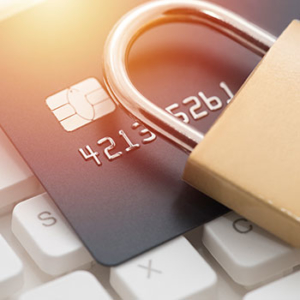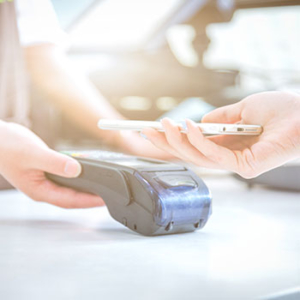 If you don’t know this already, I love to shop. It’s so much fun showing people the treasures I find and telling them about sales. My latest find is something more technology based—an RFID wallet. I’ve heard so many of my friends and family tell horror stories about their credit cards being used fraudulently. After hearing about their stories, I decided to do my homework. Now I will save you from having to do any research by explaining why RFID wallets are the way to go. I’ll also share some tips on how to keep your items safe while you’re out.
If you don’t know this already, I love to shop. It’s so much fun showing people the treasures I find and telling them about sales. My latest find is something more technology based—an RFID wallet. I’ve heard so many of my friends and family tell horror stories about their credit cards being used fraudulently. After hearing about their stories, I decided to do my homework. Now I will save you from having to do any research by explaining why RFID wallets are the way to go. I’ll also share some tips on how to keep your items safe while you’re out.
What is an RFID Wallet?
 RFID stands for Radio Frequency Identification–a short-distance electro-magnetic method for transmitting small amounts of data. Sounds complicated, right? Essentially, RFID wallets keep you from getting scammed. You see, when used correctly, RFID technology can make your life easier because it allows you to do things without taking out a credit card. Sadly though, crooks have started to use the software to electronically pickpocket unsuspecting souls.
RFID stands for Radio Frequency Identification–a short-distance electro-magnetic method for transmitting small amounts of data. Sounds complicated, right? Essentially, RFID wallets keep you from getting scammed. You see, when used correctly, RFID technology can make your life easier because it allows you to do things without taking out a credit card. Sadly though, crooks have started to use the software to electronically pickpocket unsuspecting souls.
What is RFID Skimming?
Electronic pickpocketing is called RFID skimming. When activated by an RFID reader, chips in your debit or credit cards transmit certain types of information wirelessly. On one hand, this is a fantastic invention so that you can verify your identity or even make a purchase without swiping your card. Yet, some bad eggs have begun to use this technology as a cash cow for themselves. Thieves simply walk through a crowd and obtain credit card information with their RFID skimming machine. Poof—your banking information is suddenly theirs.
Pro Tip: There is a way to tell if your credit cards or debit cards are RFID enabled. If you see a symbol of radio waves on your credit card, it’s likely RFID enabled. I just went through my wallet and there are 5 cards with this symbol on them!
An Outside Perspective
The credit card companies and lots of know-it-alls on the internet will tell you RFID skimming doesn’t happen. Why do you ask? These people WANT you to carry your card around so they can get the numbers they need. Sadly, RFID skimming is an underreported crime because consumers just can’t be sure which machine they used or site they used to purchase something. I am not saying they are foolproof, but RFID technology wallets and purses are inexpensive. So, the investment is small, but the reward—having peace of mind while shopping—is much bigger. You have to plan for your financial future.
Tips to Further Protect Yourself
 According to the FTC, credit card fraud was amongst the most frequent type of fraud reported in 2020. As a result, let’s cover some additional things you can do to protect yourself.
According to the FTC, credit card fraud was amongst the most frequent type of fraud reported in 2020. As a result, let’s cover some additional things you can do to protect yourself.
In addition to investing in RFID technology, carry your purse and wallet close to your body to prevent it being snatched away. You should also only carry one or two cards with you when you leave and leave the rest in a safe place at home. Another pro tip is to protect your wallet whenever you go out. Thieves can take pictures of your cards when you leave them out too long; for example, when you’re standing in line. If you have to type your PIN number into a credit card machine or ATM, try to conceal what you are typing. And always, always, always, put your card away immediately after you use it! Putting your card away as soon as you’re done paying the bill at a restaurant is just one example. Also, make sure you have verified the amount when it comes back to you at the table and write $0 in any blank spaces on the check.
Avoiding Quizzes and Acting Smart
Have you had any of those social media quizzes pop up in your Facebook or other sites? They ask questions like your favorite pet, your first car or where you got married. Guess what? Those questions are security questions to your accounts! Do you remember setting those security questions up? Most people don’t, but these “quizzes” were created by crooks! If you see these “fun” quizzes where your friend is asking you to play along so everyone can get to know you—avoid them! People don’t realize that by passing these things across social media they’re adding to the problem.
Fun quizzes aren’t the only thing you should avoid on the internet. Please, never open a link from someone you don’t know. These emails were constructed by crooks as a way to get your financial information. Unfortunately, you must be smart while online shopping too. Please, don’t just throw away your money at a site you’re unfamiliar with because the clothes are cute. Instead, look for the padlock icon in the address bar as well as https:// in the address field.
Personally, I make online purchases using Paypal because they offer another layer of protection. Paypal doesn’t share your full financial information with the seller, and they have state-of-the-art encryption for online transactions. They go above and beyond with dispute resolution, so feel free to buy or sell around the world.
A few more tips common sense tips to follow, then I will release you to go on a shopping spree:
- Report lost or stolen cards IMMEDIATELY
- Review your billing statements each month (try to get all of this set up online so you aren’t the victim of mail being stolen as well)
- Make passwords STRONG and keep them safe. Use a password program like Dashlane.
- SHRED or BURN anything with your credit and debit cards numbers on them. An example would be bank statements.
- Never, ever, ever give your credit card number (or any other sensitive information) on calls you receive. Hang up and dial the number on the back of the card only!
- Take a look at the gas station pump and ATM for card skimmers that are attached to the machines. If anything looks out of place or bulky, go inside and report it right away.
With a little diligence, you can prevent yourself from becoming a victim of credit card/debit card fraud. There are even more tips on the FBI’s website for those who are worried about being a victim. So, stop answering that social media “get-to-know-you” quiz and take a peep at the FBI’s page regarding fraud!
For more information regarding protecting your financial security, contact Cynthia Marotz at Allen & Co.
April 2021
Content in this material is for general information only and not intended to provide specific advice or recommendations for any individual. Third party entities are not affiliated with nor endorsed by LPL Financial or Allen & Company




